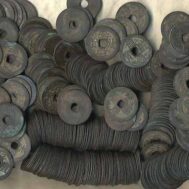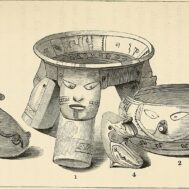“How did we get to a situation in which opposing the reburial of human remains is automatically deemed racist and can derail an anthropologist’s career?” Elizabeth Weiss, 2024

On the Warpath: My Battles With Indians, Pretendians, and Woke Warriors, by Elizabeth Weiss, Academica Press (June 10, 2024).
An August 2024 article by anthropologist Elizabeth Weiss, The New Archaeology Wars:
How Cancel Culture and Identity Politics Have Corrupted Science, in the online magazine The Skeptic tells a chilling story of censorship and ‘woke’ culture in academe. Dr. Weiss is professor of physical anthropology at San Jose State University in northern California. Her research focuses on studying skeletal remains and has included work on various ancient populations, including Native Americans and Paleoindians.
In 2017, Weiss, along with retired attorney James W. Springer, co-authored a book critically examining the impact of NAGPRA on scientific research. “Repatriation and Erasing the Past” explored how laws like NAGPRA hindered the scientific understanding of the past.
Weiss had received a prestigious award from San José State University (SJSU) for her research. However, following the book’s publication, the university’s administration shifted from celebrating her achievements to condemning her work. Her publisher received an open letter signed by nearly 900 academics, accusing the book of promoting scientific racism and calling for its retraction. Despite the backlash, Weiss and her co-author successfully argued against pulling the book, which remains widely available in university libraries. Weiss later discovered that her department chair and dean were aware of the attempt to prevent dissemination of her work and had become her adversaries, initiating what she perceived as a campaign to ‘cancel’ her.
Weiss’ article in The Skeptic details the author’s experience of censorship and her exclusion from academic dialog by her university and the larger anthropological community. The cause of Weiss’ notoriety were her arguments for the importance of scientific analysis in determining the history of the ancient Americas and against placing oral tradition on an equal or higher footing with scientific evidence. For example, she disputed claims that creationist origin myths should supplant and be given precedence over scientific data on the arrival of peoples in America. While she respected (and followed to the letter) the legal requirements of NAGPRA for repatriation to tribes based upon cultural affiliation, she questioned how determination of affiliation should rest on tribal traditions and creation myths.
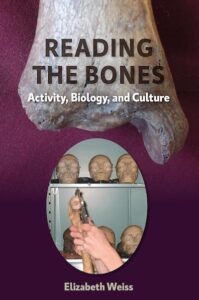
Reading the Bones: Activity, Biology, and Culture, University Press of Florida (October 31, 2017).
Weiss disagreed with current interpretations of NAGPRA under which tribes claimed all records including data analysis and histories collected from Native Americans a hundred years or more before – based upon the original tribal informants not having given written informed consent to early anthropologists. She considered it absurd to be told that in order to study the remains of peoples buried hundreds of years before, she also required their informed consent – an impossibility.
“One cultural anthropologist asked whether I had written permission from these individuals to take the photos [of bones from excavated burials], knowing full well that they had been dead for centuries!” Weiss, 2024
In disagreement with Weiss’ positions, members of the anthropological community urged that her presentations at academic conferences be deleted and publications censored and removed from libraries. She was trolled online and lambasted as ‘racist.’
Weiss, a well-known academic in the field of forensic science and physical anthropology, was prohibited from teaching alternative perspectives on study of prehistoric and historic remains, locked out of research facilities, forced to sue her university for access and the right to teach, and finally pressured into leaving her tenured university position.
According to Weiss, a ‘woke consciousness’ dominating anthropology today is devaluing and directing the field away from science. Weiss strongly objects to giving Native Americans the exclusive right to determine how to conduct research and how to share (or hide) the information. In her view, in embracing only the tribes’ perspective, current anthropology has rejected the essential give and take of academic discourse – and abandoned its duty to utilize new data and new resources in order to question what has gone before.
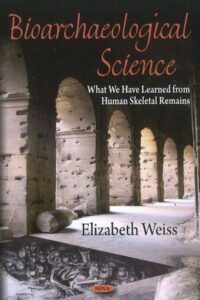
Bioarchaeological Science, by Elizabeth Weiss, Nova Science Pub Inc; UK ed. edition (January 1, 2013).
She gives examples of how a powerful movement in academe today asserts that Native Americans and other indigenous peoples have an absolute right to determine how to conduct research. Weiss believes that the current climate encourages working anthropologists and students alike to propose research that is in sync with Native American worldviews and traditional knowledge, however they are defined at the moment. She points to instances in which other academics have been prohibited from publishing books and articles. She notes that some tribes have placed a complete moratorium on access to field notes, photos, recordings, artifacts, and, of course, bones, halting all ongoing research at many institutions. Although NAGPRA returns are supposed to be limited to human remains, sacred objects needed for current religious practice, and historical objects claimed by lineal descendants – NAGPRA claims now extend to x-rays, data, and animal bones from sites, as well as ancient remains that are several thousand years old where no biological continuity can be proven.
“At SJSU, X-rays are now being labeled as “sacred objects” and upon repatriation of the human remains and artifacts, the tribes plan to burn the X-rays.” Weiss, 2024
Compare to new NAGPRA rules
It should be noted that new NAGPRA regulations issued in January 2024 explicitly state that “Consistent with the Act, these regulations require deference to the Native American traditional knowledge of lineal descendants, Indian Tribes, and Native Hawaiian organizations.” However, the rules fail to establish any standard whatsoever for what is a traditional knowledge or when it was established. The comments to the NAGPRA regulations explain that, “Native American traditional knowledge means knowledge, philosophies, beliefs, traditions, skills, and practices that are developed, embedded, and often safeguarded by or confidential to individual Native Americans, Indian Tribes, or the Native Hawaiian Community. Native American traditional knowledge contextualizes relationships between and among people, the places they inhabit, and the broader world around them, covering a wide variety of information, including, but not limited to, cultural, ecological, linguistic, religious, scientific, societal, spiritual, and technical knowledge. Native American traditional knowledge may be, but is not required to be, developed, sustained, and passed through time, often forming part of a cultural or spiritual identity. Native American traditional knowledge is expert opinion.”[1]
Constitutional issues

The Human Organism: Explorations in Biological Anthropology, by Elizabeth Weiss, Cognella Academic Publishing; 2nd ed. edition (December 28, 2017).
Weiss’ writing also notes potential conflicts with federal law prohibiting gender discrimination. She points to the adoption of practices determined by gender from the Native American community being researched – and imposing them on another community of researchers and university students, who hold different attitudes and would utterly reject conditioning research access on menstrual status in any other field of study. She notes that “Native American tribes believing in menstrual taboos will ban women who are menstruating from engaging in fieldwork, handling remains, and even eating with the rest of the crew. Many institutions, including UC Berkeley, condone this behavior.”
According to Weiss, activist anthropologists and institutions have taken the position that it is proper to censor, suppress, or modify anthropological studies of American Indians to meet the demands of Native Americans and repatriationists.
We hope Weiss’ discussion prompts questions beyond those raised by her personal story and beyond the field of Native American studies. We should each be sensitive to the culture of others. We should avoid doing harm. But we should also be mindful of the value of humanist and scientific knowledge and to its preservation for the future. If academic research on other peoples art, customs, and history must defer to and be limited by the perspective of the community being studied or its comfort level with the scope of the inquiry, then we must acknowledge the drastic limits this places on both humanist and scientific inquiry. It is one thing for a community to adopt self-censorship. That is their right, and they may set ethical rules and even legal constraints on themselves. It is quite another to impose that censorship on others.
See: Elizabeth Weiss, The New Archaeology Wars: How Cancel Culture and Identity Politics Have Corrupted Science, The Skeptic, Aug. 16, 2024.
See also: The New NAGPRA: ‘traditional knowledge’ in, artifacts out. Cultural Property News, February 12, 2024.
Books by Elizabeth Weiss
- Reburying the Past: The Effects of Repatriation and Reburial on Scientific Inquiry (Nova Science Publishers, 2008)
- Bioarchaeological Science: What we have Learned from Human Skeletal Remains (Nova Science Publishers, 2009)
- Introduction to Human Evolution 2010
- Paleopathology in Perspective: Bone Health and Disease through Time (Rowman & Littlefield, 2014)
- Reading the Bones: Activity, Biology, and Culture (University Press of Florida, 2017)
- with James W. Springer Repatriation and Erasing the Past (University Press of Florida, 2020)
- On the Warpath: My Battles With Indians, Pretendians, and Woke Warriors (Academica Press, 2024
[1] 43 CFR Part 10, Native American Graves Protection and Repatriation Act Systematic Processes for Disposition or Repatriation of Native American Human Remains, Funerary Objects, Sacred Objects, and Objects of Cultural Patrimony, Final Rule, Federal Register, Vol. 88, No. 238, Wednesday, December 13, 2023, at 86452, https://www.govinfo.gov/content/pkg/FR-2023-12-13/pdf/2023-27040.pdf
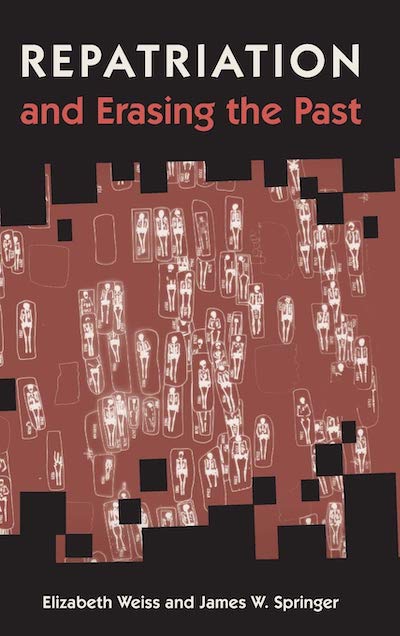 Repatriation and Erasing the Past –
by Elizabeth Weiss and James W. Springer - September 1, 2020.
Repatriation and Erasing the Past –
by Elizabeth Weiss and James W. Springer - September 1, 2020. 